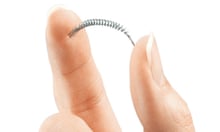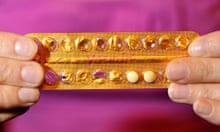A flurry of headlines and social media conversations was sparked by last week’s broadcast of Davina McCall’s Pill Revolution, a documentary I made with her for Channel 4. This was not merely because Davina courageously got her hormonal coil changed live on telly, but because it resulted in an outpouring of women talking about the deleterious effect of hormonal contraception on their mental health – and their libido. Often over years.
Yet success in highlighting this conversation comes, once again, from my own failure – failure to see what was right in front of me. I pitched and produced two menopause documentaries with Davina after my own car crash of a menopause, when I couldn’t find information to explain the hell that was happening to me: heart palpitations, rampant anxiety, memory loss and general madness.
After we commissioned a Channel 4 poll of 4,000 women, I discovered that the worst symptoms the majority of menopausal women reported were anxiety, memory loss, sleeplessness and depression. Ker-ching. Menopause was not just about hot flushes – it was about mental health. And we’d been gaslighted about that for a long time.

Afterwards, I considered myself well informed about hormones, and was writing a book about menopause, when my own daughter, Molly Macintyre, deteriorated into depression. I put it down to the misery of Covid lockdowns, being evacuated from university to home, or the loneliness of the long-distance Zoomer. We didn’t consider the effects of the contraceptive pill. Molly later said of that time: “I felt like I couldn’t speak, that if I walked into a room I’d infect others with my sadness.”
Then she came off the pill – and bounced back into the room. Molly used the term “sunshine and roses” somewhat ironically to explain the difference, but within a few weeks of stopping taking the Microgynon 30 combined pill, she was full of energy and significantly happier.
It was only after we realised this together that I remembered I’d been on Microgynon too – that same green foil packet, the wee beige pills – when I was a 17-year-old student at Glasgow University. I’d felt a bit flat and spotty for a couple of years, but it was livable. I also only realised that the pill had lowered my libido after I came off it and discovered the glories of the oestrogenic ovulation peak, both creatively and sexually. How could I not have joined the dots between my experience and Molly’s?
There’s nothing wrong with Microgynon per se. Microgynon and its generic version Rigevidon are first-choice pills on NHS formularies, cheap as chips at just over £1 a month. They combine synthetic oestrogen and levonorgestrel progestin, and are among the safest, most-tested pills. But they have remained unchanged for half a century – in the film, we show that Microgynon is now in a glass case in the Science Museum. Of course, there are at least 40 other pills with newer progestins which may have a completely different effect on mood and libido in different women – but it requires trial and error.
Under “less serious side effects” on the Microgynon packet leaflet, it mentions: “depressive moods or mood swings”. But who reads those leaflets? I didn’t, but then Molly showed me a slew of posts on TikTok. Gen Z-ers like her were unfurling the pill side-effects leaflet, and using it as a blanket (I think the American version is larger), angry that they too were being gaslighted.
Dozens of girls popped up alongside various overly loud tunes to tell us how much better they felt since coming off the pill – “going from black and white to colour”. There was a lot of exaggeration and misinformation too. So what is the truth?
Molly did some research, unearthing a 2016 Danish study of over a million women in the country’s database which showed that women were more likely to be started on antidepressants for the first time or be diagnosed with depression if they were currently using or had recently used hormonal contraception. And guess what? The strongest association was observed among teenage girls.
Plus the levels of depression were even higher on the hormonal coil. But enough large randomised controlled trials hadn’t been done, and this was “only” an observational study, said most of the medical literature.
It felt like the menopause scenario again – women and people assigned female at birth being gaslighted about their truth, and sent home to keep calm and carry on. So we pitched a documentary on contraception to Channel 4. Plus, it turned out that one of Davina’s daughters had a hard time on the pill too. Davina was fired up to tackle this next piece of medical misogyny.
Again, we realised we needed a survey to fill the black hole in medical research and discover what women actually experienced. The results from over 4,000 replies were gobsmacking: 77% of women said they had side-effects on the pill, and 36% had anxiety, depression or low mood, and that was the main reason they stopped. Wish I’d known that earlier. Also, it turned out that 21% had suffered from low libido on the pill – one in five women, quite a loss to the nation. The science papers agreed here – the combined pill reduces levels of free testosterone in women.
Alice McShane, the director, was keen on myth-busting, and we discovered that almost half of pill-users in the survey thought they had to take a monthly seven-day break for a “pill bleed”, when medical guidance says it’s not necessary. Following the broadcast, there were women raging the next day over years of messy bleeding, wasted Tampax, and unnecessary hormonal ups and downs.
There is so much more to be done, so many myths to bust, and there are some fantastic leaps forward in male contraception and better-tolerated body-identical hormones for women which need more investigation. I’m writing a book about it all, Everything You Need to Know about the Pill (But Were Too Afraid to Ask), out January 2024, and learning from my mistakes.
Do you have an opinion on the issues raised in this article? If you would like to submit a letter of up to 250 words to be considered for publication, email it to us at observer.letters@observer.co.uk










